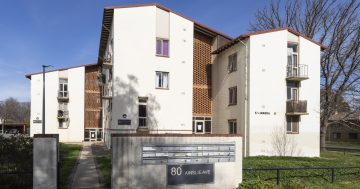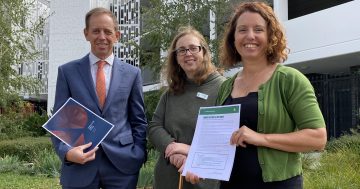
Gas is to go by 2045, but ACTCOSS is worried that lower-income households will be disadvantaged in the process. Photo: iStock.
The ACT’s peak welfare group has called for landlords to be banned from installing or replacing gas appliances in their rental properties by June 2024.
It is one of a number of recommendations directed at the private rental market by the ACT Council of Social Service (ACTCOSS) in a new report on a more equitable transition to electrified households in the ACT.
The ACT aims to move away from fossil fuel gas to renewable electricity by 2045.
ACTCOSS proposes a carrot-and-stick approach, combining stronger enforcement with incentives, to encourage landlords away from gas and to make their properties more climate resilient.
The report says low-income households are the big losers in the energy transition, with wealthier homeowners able to update their appliances and take advantage of incentives such as interest-free loans offered through the Sustainable Household Scheme.
It says that for people on lower incomes, the main barriers to switching from gas to electricity are cost, the fact they usually rent, and lack of information.
The report found almost half (45 per cent) of households surveyed noted cost as a barrier, only 22 per cent said they would be able to transition in the next five to 15 years without government assistance and most (74 per cent) said they would be more likely to make the switch with government support.
It says transitioning rental properties will be one of the biggest challenges the ACT Government faces, along with complex builds like apartments, and hard to transition industries.
“There is no simple, single solution to electrify and improve energy efficiency in the rental stock; it will require a range of measures,” the report says.
But leaving it up to landlords to do the right thing was not an option.
The report says that like the no new connections legislation, regulation preventing households from replacing appliances with gas-run appliances will help to shift behaviour and expectations.
“It will ensure that when appliances do need to be replaced, they are not simply replaced with the same inefficient appliance, when electric and more efficient alternatives are available,” the report says.
But ACTCOSS also suggests the government further explore incentives for landlords to electrify their rental properties, such as a subsidy for owners of fully electric properties who rent to tenants in the bottom income quintile or making privately rented properties eligible for the Sustainable Household Scheme if the cost of the rent is in the bottom 10 per cent of rented properties in ACT.
ACTCOSS wants stronger tenancy rights regarding modifications, minimum standards and more secure leases, arguing tenants may make modifications themselves if they are on a long-term lease.
It also wants monitoring of rental properties to ensure landlords are complying with the new minimum standard for ceiling insulation and stronger enforcement.
When it comes to energy efficiency ratings for rental properties, ACTCOSS suggests lower rated properties attract higher rates to give landlords an incentive to upgrade.
The report calls for expanded targeted financial support to assist low-income households to improve energy efficiency and transition from gas to electricity and for all public and social housing dwellings to be upgraded, including draughtproofing, insulation and electrification.
It recommends the government expand the SHS to include renters who could use it to buy portable electric stoves, portable, energy-efficient heaters or coolers, or electric bikes.
The government should also subsidise the gas abolishment fee for low-income households and community housing providers.
Real Estate Institute of the Australian Capital Territory (REIACT) CEO Maria Edwards said members were already being advised to tell their clients that if a gas appliance needed replacing they should install an electric one.
Ms Edwards said it was a bit preemptive to call for regulation at this stage before there was a clear pathway for how the government was going to roll out what would be a complex transition process involving not just freestanding homes but also multi-storey dwellings, apartments and townhouses.
She said many landlords would self-regulate given they would not want to spend money on something that would have to be replaced eventually anyway.
“With the right amount of education for landlords there shouldn’t be a need to regulate,” Ms Edwards said.
The lessons of the minimum ceiling insulation standard introduction, where there was a lack of materials and only one installer, should be a warning for the government to get the workforce and supply of materials right.
Ms Edwards said eligibility for the Sustainable Household Scheme should be reviewed so landlords could access it to help with the transition.
She said imposing extra costs was not the way to keep homes in the rental market, given there was evidence that some landlords were selling up.
But it was a case of waiting for more detail from the government about what to expect, she said.
A government spokesperson said the government was currently consulting on a position paper to inform the ACT’s Integrated Energy Plan – a detailed plan to electrify the city and achieve its goal of zero net emissions by 2045.
“Consultation is open until 12 September and the plan is intended to be released in early 2024,” he said. “We will be considering the recommendations from the ACTCOSS report alongside input from other community stakeholders as part of this consultation process.”
The spokesperson said ACTCOSS recommendations targeting support to lower income homeowners, public and social housing, and seeking opportunities to address barriers for renters were similar to those identified in the position paper.
“We have already implemented a range of measures to support those who need assistance and we will continue to evaluate and adjust or tailor these programs as required,” he said.
“As we move forward, our objective remains clear: to navigate this transition in a manner that is fair, equitable, and considerate of the diverse challenges faced by our community members.”





















